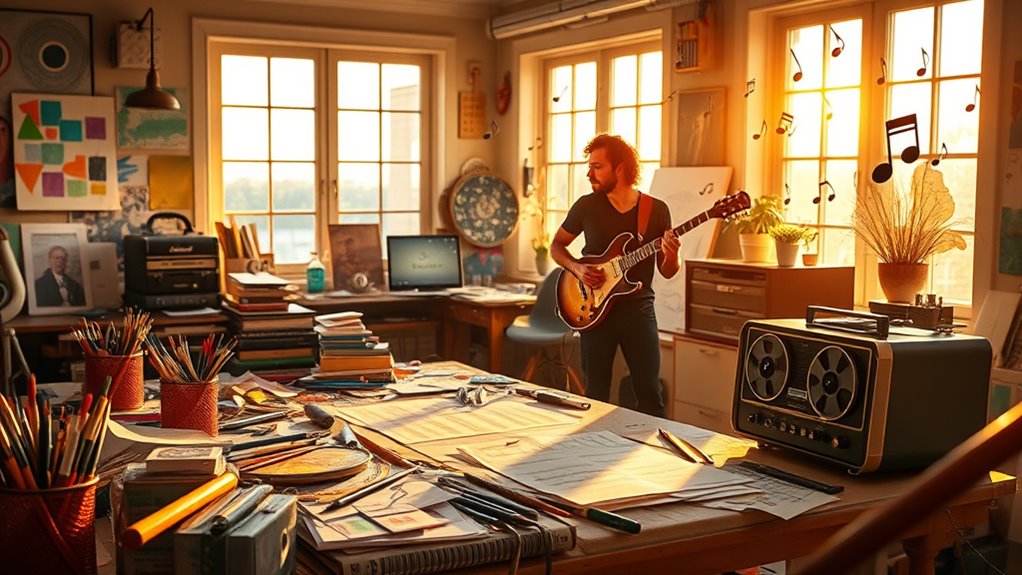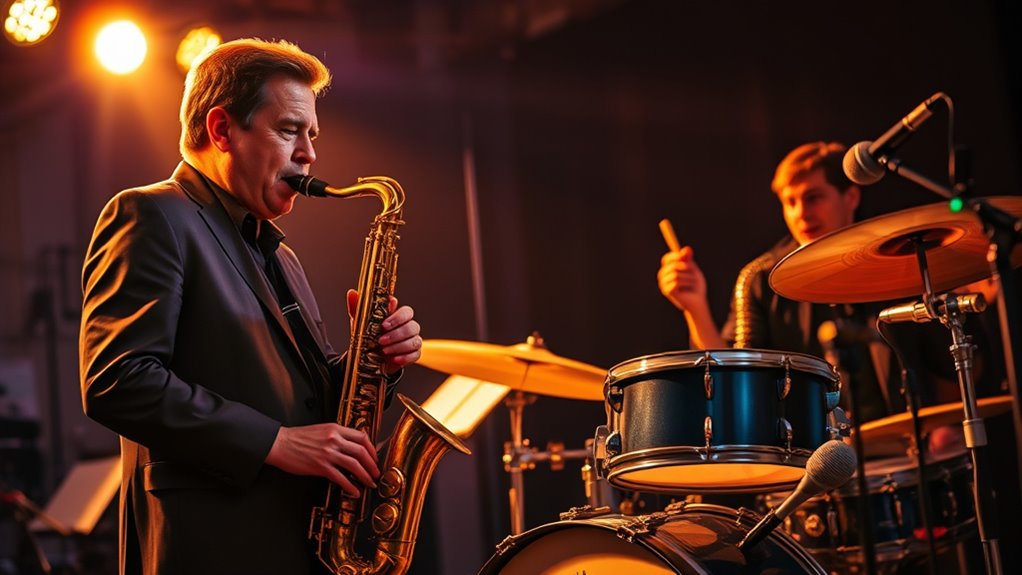Music energizes your mind and unfastens your creative potential by shaping your mood, sparking insights, and transforming inspiration into tangible ideas. Choosing the right genre — whether classical for focus, or energetic styles for motivation — can help shift your mental state and break mental blocks. By intentionally incorporating music into your routine, you can enhance clarity and emotional well-being. Keep exploring, and you’ll discover how music becomes an essential tool to elevate your creativity.
Key Takeaways
- Music enhances mental clarity and emotional well-being, fostering a conducive environment for creative thinking.
- Different genres evoke specific emotions, guiding mental states and inspiring diverse creative approaches.
- Switching musical genres can break mental blocks and stimulate new insights during creative sessions.
- Regularly integrating music into routines conditions the brain for easier access to creative and imaginative states.
- Selecting music aligned with personal goals amplifies its power to motivate and clarify the creative process.

Music has a powerful ability to ignite creativity and inspire new ideas. When you listen to music, it’s not just background noise; it’s a catalyst that can release your mind’s potential. Many people turn to music therapy for its proven benefits in enhancing mental clarity and emotional well-being. This practice often involves carefully selecting music that resonates with your mood or intentions, helping you tap into deeper layers of creativity. Whether you’re working on a project, brainstorming, or simply trying to find fresh perspectives, music therapy can serve as a tool to facilitate those moments of insight.
Music sparks creativity and insight, transforming listening into a powerful tool for mental clarity and emotional growth.
One of the most fascinating aspects of how music influences creativity is the role of genre. Different genres evoke distinct emotions and mental states, which can steer your thinking in unique directions. For example, calming classical music may foster focus and introspection, making it easier to analyze complex ideas or develop intricate solutions. On the other hand, energetic genres like rock or electronic dance music can boost your motivation and inspire spontaneous bursts of inspiration. By intentionally choosing a genre that aligns with your creative goal, you set the stage for your mind to wander, explore, and connect ideas you might not have considered otherwise.
Your environment and musical choices can shape your creative process profoundly. If you’re feeling stuck on a problem, switching genres from ambient soundscapes to upbeat pop might shift your mental state enough to spark new insights. The influence of genre isn’t just about mood; it’s about the rhythm, tempo, and even the cultural associations tied to a style of music. These elements can help you break free from mental ruts and encourage a more playful, open-ended approach to your work. Additionally, understanding the asset division laws and strategies can help you approach complex situations with a clearer mindset, much like choosing the right music genre can influence your creative flow.
Furthermore, integrating music into your routine can enhance your ability to think creatively over time. Regularly using specific genres or music therapy techniques creates a conditioned response, signaling your brain to enter a more receptive, imaginative state. Over time, this can make it easier to access those creative energies whenever you need them. The key is to be intentional with your musical choices, understanding how different sounds influence your mood and thought patterns. When you harness the power of genre influence through mindful listening, you give yourself a valuable tool to elevate your creative endeavors and keep your ideas flowing freely.
Frequently Asked Questions
How Does Music Influence Brain Activity Related to Creativity?
Music influences your brain activity by strengthening neural pathways linked to creativity. When you listen to or create music, it boosts cognitive enhancement, helping you think more flexibly and solve problems more innovatively. This stimulation activates areas involved in imagination and idea generation, making it easier for you to access creative thoughts. As a result, music becomes a powerful tool to enhance your creative processes and mental agility.
Are Certain Genres More Effective at Boosting Creative Thinking?
Certain genres can definitely boost your creative thinking, depending on their influence and musical mood. For instance, classical and jazz often foster focus and free-flowing ideas, while upbeat pop or energetic rock might energize your inventive impulses. The genre influence shapes your mood, making you more open to new ideas or deep concentration. Experiment with different styles to find what fuels your creative fire best—there’s no one-size-fits-all!
Can Music Improve Creativity in Non-Musicians Equally?
Yes, music can improve your creativity even if you’re not a musician. Engaging in music therapy or musical improvisation helps boost your imaginative thinking and problem-solving skills. You don’t need formal training—just actively listening or creating spontaneous sounds can stimulate your brain. These activities encourage free expression, making it easier for you to think outside the box and find innovative solutions in various areas of life.
What Psychological Factors Enhance Music’s Impact on Creativity?
Think of your mind as a garden, where emotional engagement acts like sunlight, fueling growth, and cognitive flexibility as water, helping ideas flow freely. When you’re emotionally connected to music, it deepens your engagement and sparks creativity. Your ability to adapt your thinking allows new melodies and ideas to blossom. By nurturing these psychological factors, you discover music’s full power to inspire and amplify your creative potential.
How Does Individual Musical Preference Affect Creative Benefits?
Your personal taste plays a vital role in how music boosts your creativity. When you listen to music that resonates emotionally, you form a strong emotional connection, which can inspire more innovative ideas and problem-solving. If you choose music that aligns with your preferences, you’re more likely to feel motivated and engaged, amplifying the creative benefits. So, selecting music you genuinely enjoy enhances your ability to think creatively and feel more inspired.
Conclusion
You might be surprised to learn that 65% of people find their best ideas come when listening to music. Music acts as a powerful catalyst, releasing your creative potential and inspiring fresh perspectives. By incorporating tunes into your routine, you create an environment that fosters innovation and problem-solving. So, next time you’re stuck, turn on your favorite song—chances are, it could spark the breakthrough you’ve been waiting for. Let music be your secret weapon for creativity.









